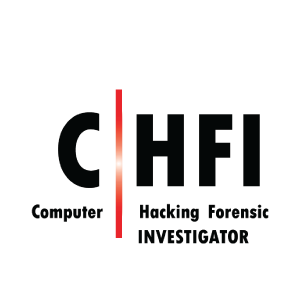
The EC-Council Certified Hacking Forensic Investigator (CHFI) certification is designed for professionals involved in digital forensics and incident response. It equips individuals with the skills and knowledge needed to investigate cybercrimes, gather evidence, and analyze digital artifacts to identify and mitigate security breaches.
Duration: 5 Days
$2,295.00
The CHFI certification is ideal for professionals involved in cybersecurity, digital forensics, incident response, law enforcement, and legal fields. It is suitable for roles such as forensic analysts, incident responders, digital investigators, security analysts, law enforcement officers, and legal professionals.
The CHFI certification focuses on teaching individuals how to conduct a comprehensive forensic analysis of digital evidence, including computers, networks, mobile devices, and cloud environments. It covers techniques for gathering, preserving, examining, and presenting digital evidence in a legally admissible manner.
The CHFI certification exam covers several domains, each representing a different aspect of digital forensics and incident response:
The EC-Council Certified Hacking Forensic Investigator (CHFI) certification offers several benefits to professionals working in the field of digital forensics, incident response, cybersecurity, and law enforcement:
Overall, the EC-Council Certified Hacking Forensic Investigator (CHFI) certification offers numerous benefits for professionals seeking to enhance their skills, advance their careers, and make a positive impact in the field of digital forensics and incident response.
The CHFI certification exam consists of multiple-choice questions and practical scenarios that test candidates’ knowledge and skills in digital forensics and incident response. The exam covers a wide range of topics, including forensic investigation processes, tools, techniques, and legal considerations.
The EC-Council Certified Hacking Forensic Investigator (CHFI) certification is designed for professionals involved in digital forensics and incident response. It equips individuals with the skills and knowledge needed to investigate cybercrimes, gather evidence, and analyze digital artifacts to identify and mitigate security breaches.
The CHFI certification is ideal for professionals involved in cybersecurity, digital forensics, incident response, law enforcement, and legal fields. It is suitable for roles such as forensic analysts, incident responders, digital investigators, security analysts, law enforcement officers, and legal professionals.
The CHFI certification focuses on teaching individuals how to conduct a comprehensive forensic analysis of digital evidence, including computers, networks, mobile devices, and cloud environments. It covers techniques for gathering, preserving, examining, and presenting digital evidence in a legally admissible manner.
The CHFI certification exam covers several domains, each representing a different aspect of digital forensics and incident response:
The EC-Council Certified Hacking Forensic Investigator (CHFI) certification offers several benefits to professionals working in the field of digital forensics, incident response, cybersecurity, and law enforcement:
Recognition of Expertise: CHFI certification validates professionals’ expertise in digital forensics and incident response, demonstrating their ability to investigate cybercrimes, gather evidence, and analyze digital artifacts effectively.
Enhanced Career Opportunities: CHFI certification opens up new career opportunities for professionals in roles such as forensic analyst, incident responder, digital investigator, security analyst, law enforcement officer, and legal professional. Certified individuals may qualify for higher-level positions and increased responsibilities within their organizations.
Industry Recognition: CHFI certification is recognized globally as a leading credential in the field of digital forensics and incident response. It is widely respected by employers, government agencies, law enforcement agencies, and cybersecurity professionals.
Skill Development: The CHFI certification exam covers a comprehensive range of topics related to digital forensics, including forensic investigation processes, tools, techniques, and legal considerations. Pursuing CHFI certification helps professionals develop practical, hands-on skills that are directly applicable to real-world scenarios.
Legal Admissibility: CHFI-certified professionals learn how to conduct forensic investigations and gather digital evidence in a legally admissible manner. This is essential for ensuring that evidence collected during investigations is admissible in court and can be used to prosecute cybercriminals.
Increased Credibility: CHFI certification enhances professionals’ credibility and reputation within the cybersecurity and digital forensics communities. Certified individuals are recognized as subject matter experts in their field, and their opinions and expertise are valued by colleagues, employers, and clients.
Continuing Education and Renewal: CHFI certification requires professionals to engage in continuing education activities to maintain their certification. This encourages ongoing learning and professional development, ensuring that certified professionals stay current with the latest trends, technologies, and best practices in digital forensics.
Networking Opportunities: Becoming certified in CHFI connects professionals with a global community of digital forensics experts, incident responders, cybersecurity professionals, and law enforcement officers. Networking with other certified professionals can provide valuable insights, support, and collaboration opportunities in the digital forensics field.
Overall, the EC-Council Certified Hacking Forensic Investigator (CHFI) certification offers numerous benefits for professionals seeking to enhance their skills, advance their careers, and make a positive impact in the field of digital forensics and incident response.
Basic IT Skills: Candidates should have a foundational understanding of computer systems, networks, operating systems, and common software applications. This includes knowledge of hardware components, operating system functions, file systems, and network protocols.
Work Experience: While there might not be strict work experience requirements, having some experience in roles related to cybersecurity, digital forensics, incident response, or law enforcement is beneficial. EC-Council often recommends that candidates have at least two years of experience in a relevant field before pursuing the CHFI certification.
Training: Candidates are typically required to complete an official EC-Council CHFI training course offered by an accredited training provider. The training provides in-depth coverage of digital forensics principles, techniques, tools, and best practices, preparing candidates for the certification exam.
Knowledge of Legal and Ethical Considerations: Candidates should have a basic understanding of legal and ethical considerations related to digital forensics investigations, including laws and regulations governing the collection, preservation, and presentation of digital evidence.
Understanding of Forensic Investigation Processes: Candidates should be familiar with the forensic investigation process, including evidence collection, analysis, documentation, and reporting. Knowledge of industry-standard forensic investigation methodologies and frameworks is beneficial.
The CHFI certification exam consists of multiple-choice questions and practical scenarios that test candidates’ knowledge and skills in digital forensics and incident response. The exam covers a wide range of topics, including forensic investigation processes, tools, techniques, and legal considerations.
5 days
$2,295.00
In just 7 days, you’ll discover your potential, elevate your confidence, and determine if you’re truly prepared to achieve certification, advancement, and reward—through an engaging self-assessment challenge crafted specifically for ambitious IT professionals.

@ Copyright SteppingStone Solutions, Inc. 2024-2025 All Rights Reserved